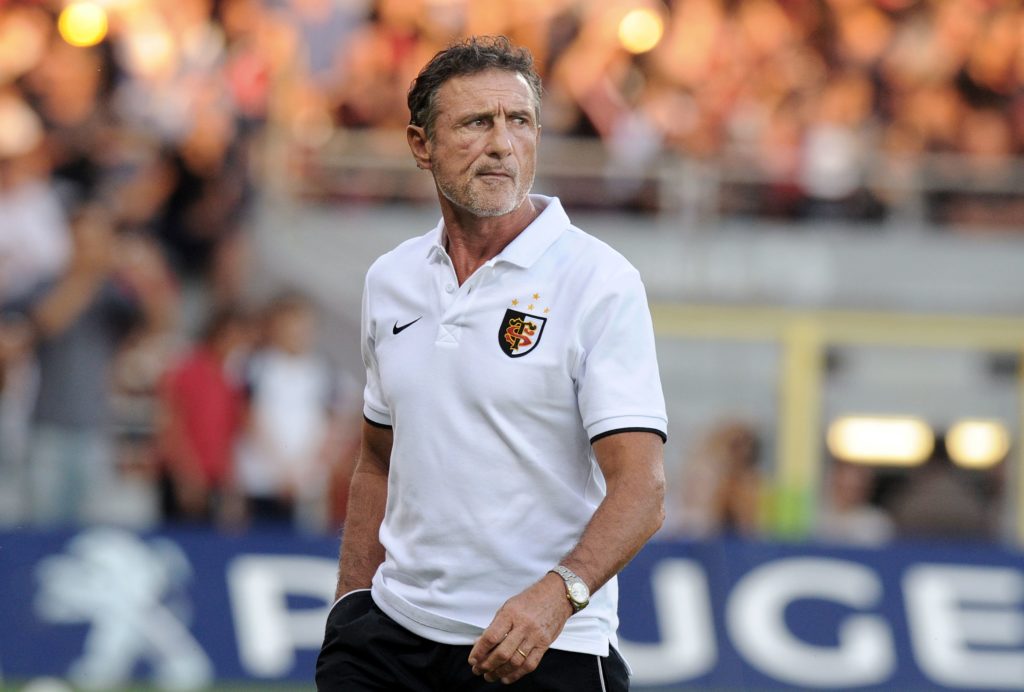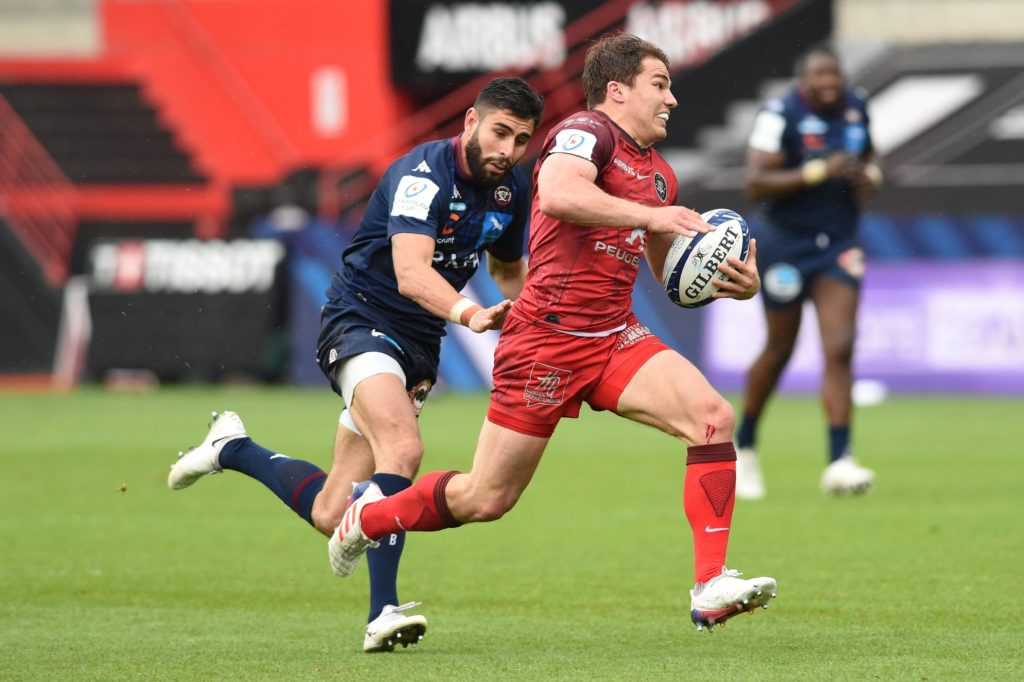For reasons that now escape me I allowed myself to get married on the same day in 2003 that Toulouse took on Perpignan in the Heineken Cup Final. I must have mislaid my sporting calendar when I popped the question to my French fiancée .
Her cousin, who chauffeured me and my wife from the church in Rodez to the hotel reception in his vintage Citroen, was far from impressed. All was not lost, however, for we picked up most of the second-half on the car radio so he was able to cheer on his beloved Toulouse as they won their second European title.
That was a good decade to support the club. They made it a hat-trick of victories in 2005, and added a fourth title in 2010 when they edged out Biarritz in the Stade de France, their fifth appearance in a Heineken Cup final in eight seasons. At that time no other club had won more than two European titles. Truly, Toulouse were the kings of Europe. And then they were deposed in a bloodless coup. It was a slow – albeit painful – decline.
I would see my wife’s cousin, godfather to our daughter, at family occasions, and he tried to steer clear of talking about Toulouse. It was too raw, especially when Toulon won a hat-trick of titles. Toulon had Jonny Wilkinson, Bakkies Botha and Chris Masoe; Toulouse had Jean-Marc Doussain, Grégory Lamboley and Gillian Galan.
Noves was rugby’s Arsene Wenger, good in the early years, celebrated for his innovation and attention to detail but as the years passed, their competitors caught up and then accelerated past.
He was one of the few Toulouse faithful to speak the unspeakable: that Guy Noves had to go. That was heresy for most fans. After all, the man was a God. Wasn’t he? He wore the shirt for many years as a player before becoming coach in 1988-89. He stood down in 1990 but was re-appointed three years later and remained in charge for 22 years.
He was rugby’s Arsene Wenger, good in the early years, celebrated for his innovation and attention to detail. Success came easily to both. But as the years passed, their competitors caught up and then accelerated past. Noves and Wenger became relics, unable to keep pace with the changing nature of their sports and no longer with the eye to spot and nurture young talent.
The final years of their respective reigns were wretched. No trophies and few fans. And when Noves did finally depart, in June 2015, in his 62nd year, he left behind a decaying infrastructure and a squad of talented but poorly coached players.
In his recent autobiography, Noves, arguably the biggest ego ever seen in French rugby (and he’s up against some pretty stiff competition) settled some scores with Toulouse about the manner of his departure. “I had the belief that I represented something important for my players, it’s even certain,” he wrote. “It was extremely strong with the players of all generations. But Toulouse marked my departure…in a half empty stadium.”

Who was to blame for that? In the final years of the Noves’ empire, average home gates fell from 20,100 in the 2011-12 season to 16,823 in 2015.
I first saw Toulouse in the ‘flesh’, so to speak, in April 2000 when they played Clermont in the quarter-final of the Heineken Cup. The match was moved to the Stadium de Toulouse to accommodate more fans – about 37,000 – and the atmosphere was exhilarating. But it was an ageing Toulouse backline and Michel Marfaing Jerome Cazalbou, Emile N’Tamack and Stéphane Ougier were defeated by Munster in the semis.
Noves knew the time had come for a new generation. In January 2002 I visited the club to interview three of the young bucks all recently capped. In the club restaurant I sat at a table speaking to 19-year-olds Frédéric Michalak and Clément Poitrenaud, as well as Nicolas Jeanjean, a comparative verteran at 20. Michalak was shy and inarticulate; Jeanjean lively and confident. Poitrenaud, now the Toulouse backs coach, was the most engaging of the three, an intelligent and curious young man.
Jeanjean’s career was curtailed by injury but Michalak and Poitrenaud won over 100 caps for France between them. They won plenty of silverware, too, at Toulouse and yet the feeling remains that their true potential was never fully tapped. What might they have achieved under a more enterprising and imaginative coach?
There is a touch of Gareth Edwards to Dupont’s game, physique and character; the same ebullient nature, quick wits, the love of what they do.
Seventeen years later, in May 2019, I was back at Toulouse interviewing another trio of young talent in Antoine Dupont, Romain Ntamack and Thomas Ramos. In the two years since, Dupont has established himself as the new star of French rugby, and the most gifted scrum-half in the northern hemisphere.
There’s a touch of Gareth Edwards to his game, his physique and his character; the same ebullient nature, quick wits, the love of what they do. Already Dupont has achieved a level of respect in the Anglophone rugby world that eluded Michalak, who never shook off the ‘mercurial’ cliché.
Dupont joined Toulouse from Castres in the summer of 2017, the same time that Cheslin Kolbe arrived from South Africa. Talk about a couple of canny signings, the former voted the Player of the Year by Midi Olympique in the last two seasons, Kolbe nominated the Foreign Player of the Year in 2019.
Take a bow, Ugo Mola, Guy Noves’ successor, a member of the Toulouse side that beat Cardiff in 1996 to win the inaugural Heineken Cup. Mola signed the two when Toulouse were at rock bottom. They had finished eleventh in the 2016-17 Top14 season as the team continued its painful transition from the Noves era. One or two players didn’t go quietly, like Patricio Albacete.

The Argentine lock was a Noves’ man, signed in 2006, and he told L’Equipe in May 2017 that his successor was not up to the job. “Replacing a manager like Guy Noves, with the experience and the prerogatives that he had, it’s not easy,” said Albacete. “The suit was perhaps too big for him [Mola]. He hasn’t the shoulders to take on a squad like that…we don’t know who does what [but] fortunately there are good blokes in this team otherwise it would have exploded a long time ago.”
Albacete was one of several big names to leave the club in the summer of 2017. With him went Grégory Lamboley, after 17 seasons, Thierry Dusautoir (11 seasons), Census Johnston (nine seasons), Gurthrö Steenkamp and Luke McAlister (both six seasons).
Another significant departure that summer was René Bouscatel, the 71-year-old president of the club, who had been in the role for 25 years. Since 2014 Toulouse had been in a structural deficit, its finances on the wane as much as its fortunes on the field. Bouscatel was succeeded by the 46-year-old Didier Lacroix, who was more attuned to the business world of the internet age.
In the summer of 2017 a ten-year partnership was agreed with Infront Sports & Media where the Swiss company was handed responsibility for the club’s sponsorship, hospitality, media and digital rights. It’s been a profitable return so far for Toulouse, whose budget for the 2020-21 season is €35.5m, €4 million more than in the 2016-17 season. The pandemic will obviously have an impact on the club’s finances but they are better placed than their rivals to weather the economic storm of the past 15 months. One initiative of Lacroix’s was the construction of a ‘Wall of Support’ at the club’s Stade Ernest-Wallon, where fans were able to buy a brick and inscribe it as they pleased. Twelve thousand bricks were sold, ranging in price from €30 to €150.
In reaching the 2021 final Toulouse have beaten two European giants in Munster and Clermont and along the way they’ve been pragmatic and at other times they’ve played with panache; in short, there is a maturity now to Toulouse’s game that was absent two seasons ago.
Two years after the changing of the guard Toulouse won their first Top 14 title since 2012. They were back. Yet a thumping 30-12 defeat to Leinster in the semi-final of the Champions Cup that season underlined that they were still some way short of European domination.
I interviewed Dupont, Ramos and Ntamack just a couple of weeks after that hammering. The memory still hurt. “I was completely dead at the end of that Leinster game,” Ramos said. “It was the most intense match I’ve ever played.” In Dupont’s opinion there wasn’t “much difference in intensity and technical skill between playing against clubs like Saracens and Leinster, and playing in the Six Nations.”
Both expressed their burning ambition to win the Champions League but they fell at the semi-final stage again in 2020, this time losing to Exeter. Third time lucky this season? In reaching the 2021 final Toulouse have beaten two European giants in Munster and Clermont and along the way they’ve been pragmatic and at other times they’ve played with panache; in short, there is a maturity now to Toulouse’s game that was absent two seasons ago. That’s only to be expected. Dupont is still only 24, Ntamack 22 and their captain, Julien Marchand, impressively composed, has just turned 26.
Ugo Mola has also grown into the job, building a squad and a philosophy in his image. Noves was a former schoolteacher and it showed in how he handled his players. Mola’s ethos is different to his authoritarian predecessor. “I don’t want to coach players who obey my every word,” he once said. “I want guys who are audacious.”
He’s got them. That sense of adventure will be Toulouse’s greatest weapon against the power play of La Rochelle on Saturday.
More stories by Gavin Mortimer
If you’ve enjoyed this article, please share it with friends or on social media. We rely solely on new subscribers to fund high-quality journalism and appreciate you sharing this so we can continue to grow, produce more quality content and support our writers.


Comments
Join free and tell us what you really think!
Sign up for free